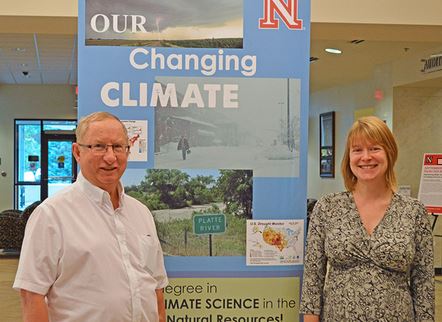
A new undergraduate major in applied climate science aims to educate the next generation of climatologists and policymakers.
"In the last decade we have seen international, national, regional and state discussions of climate and an interest in Congress in how to address climate services and climate impacts," said Ken Hubbard, professor of applied climate science. "The ACS faculty see a need for climatologists who can contribute to an informed and interdisciplinary approach to addressing climate issues."
Applied climate science involves the study of short-term climate variability, long-term climate changes and how those impact everyday life.
Students in the major can expect to take science background courses in water, plant and soil science as well as courses in communications and social sciences. Math and statistics courses will underpin the core courses in meteorology and climatology.
While the applied climate science program has been open to graduate students for several years, opening it up to undergraduates enables students to jumpstart their careers early on.
"We could see that employment opportunities were expanding in the area of applied climate science and wanted to be ahead of the curve in helping students see this emerging area of employment," said Ken Dewey, professor of climatology. "It excites me to know that new job opportunities abound for students in this area of study and these jobs exist all over the world."
Potential opportunities include positions with environmental consulting firms, agribusinesses, planning agencies, non-governmental organizations and governmental agencies addressing climate issues.
In August, Barbara Boustead earned her Ph.D. in applied climate science. Now as a forecaster at the National Weather Service office in Omaha, she maintains the office's climate program.
"(That) includes conducting local studies of climate impacts in our area, understanding the influence of climate variability and change and communicating it to our citizens, and providing climate information to support operations during high-visibility events in our area," she said.
For Boustead, a background in applied climate science is invaluable – especially when combined with other areas of learning.
"These could span a wide range of subject areas including meteorology, plant and animal sciences, agriculture, ecology, law, government and public policy, economics, sociology and so many others," she said.
Moreover, undergraduates who opt to major in applied climate science will be well-positioned to tackle complex and increasingly relevant issues.
"Students will have the opportunity to integrate climate understanding into their knowledge base from early in their college education," Boustead said. "They will be at the forefront of climate-based decisions long into the future, and they'll be able to assist those decisions with science-based knowledge."
The University of Nebraska has long recognized the importance of weather, climate and climate variability in the state. Back in the 1870s, NU formed the Nebraska Volunteer Weather Service, a weather and climate monitoring program for the state.
UNL would go on to host the state climatologist's office (currently held by Al Dutcher), establish a program in meteorology and climate, and organize an Extension committee on impacts of weather on the state. UNL is also home to the High Plains Regional Climate Center, the National Drought Mitigation Center and the applied climate science group in the School of Natural Resources.
"I cannot imagine society becoming less impacted by climate," Dewey said. "There will always be a need to better understand our climate system and how it impacts all of our human activities."
Students interested in learning more about the applied climate science major should contact Amanda Bergeron-Bauer, SNR recruitment coordinator, at abergeron2@unl.edu.
— Mekita Rivas, Natural Resources